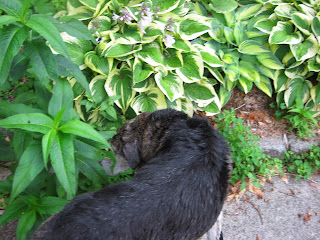
I did once, my companion, hold you in awe.
I did regard the words of your mouth as commandments
Incontestable ... in your presence--
(
but as the gaze of your eye was absent from me, not so much;
when the den was mine to traverse alone upon the agile paws of nervous anxiety,
then I must have to follow the multitudinous scent receptors of my snout
unto the bounties of biscuits and kibble and pumpkins and olive oil and pens and underwear and tissues and laundry
that thoughtless primates had left strewn about in closed cabinets and behind doors closed only, neither bolted, nea, nor locked either)--
Yea, incontestable ... -ish.

In those days you spake unto me with many words of commandment,
Words that I did know with the quickness of my quick ears--
You spake unto me the command "Leave it,"
And as I heard the command I did so leave a cornucopia of
its,
Its beyond count and beyond compare--
I did avert the keenness of my snout,
Did neglect even the finest delicacies strewn by wanton human hands
Upon the pavements of our perambulation.
And you uttered to me also the command "No,"
And then also did I avert my gaze, and also my longing,
From the table upon which you made your daily repasts, infinite and sumptuous,
Yea, did avert my gaze even when your sumptuous repast awaited your return,
Unattended upon tables only as high as the jaws of a dog
About as high only as this, the height of my withers;
Nea, I transgressed not this command "no" even on the day you called "trash"--
I did forego the gifts of magnanimous bags, riven before me,
Their bounty, so putrid and so fragrant, spilling forth,
An intoxication to the scent receptors of my mighty nose.
Yea, in these days of my puppyhood, I was a compliant dog,
Strong in my will and abundant of my eagerness to please you,
Basking in these your rewards, the words of your mouth and the treats of your hand and the constancy of you.
Forgive me now, my companion, my grabbings, my growlings, and also my deafness--
Many years upon so many years again have stopped up my ears to these your commands.
Yea, their fabled quickness is now but a thing of fables,
Also do these years weigh upon my canine and tenacious will,
Grown now weary and fragile like the unintelligently designed spine of a dachsund.
For while these heavy burdens do make this
canis lupus neither more nor less
hungrious,
Their weight vanquishes my
inhibitious and overwhelms my
familiaris.















